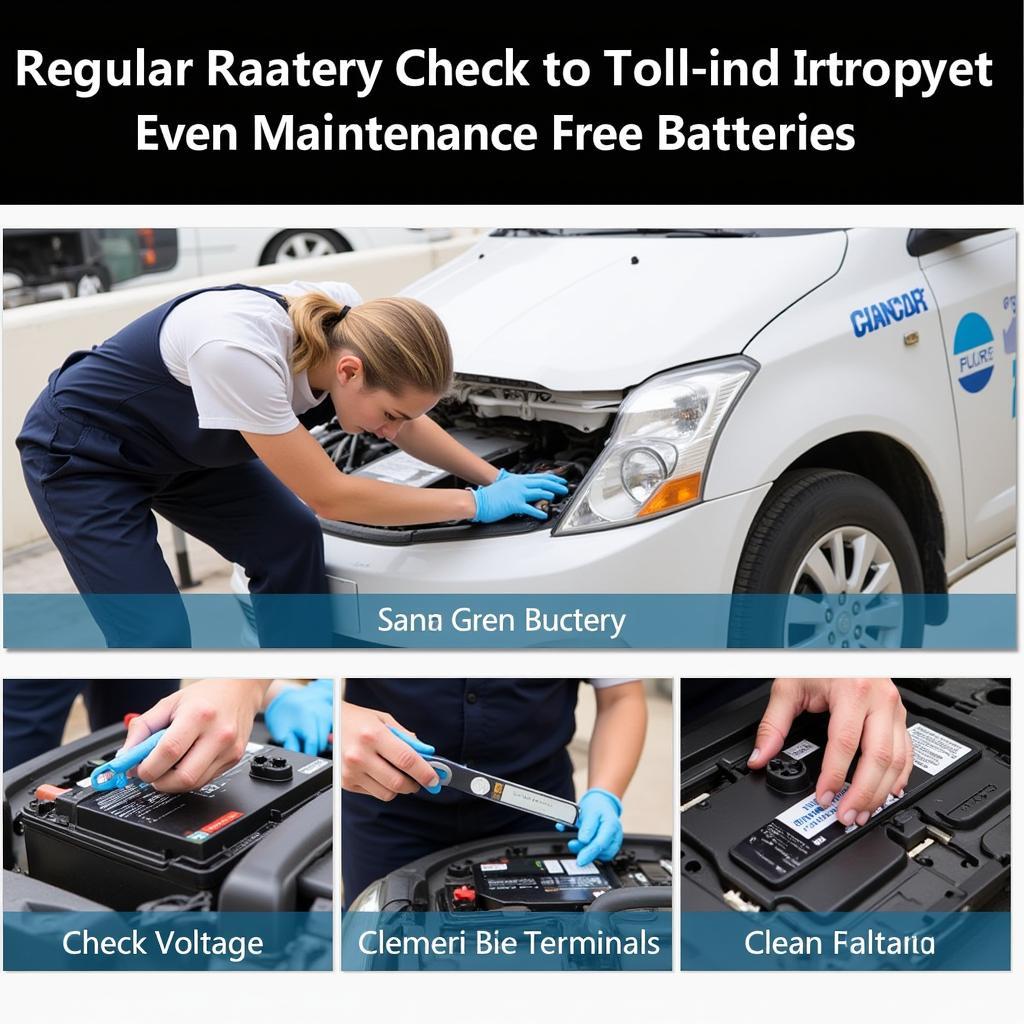Car batteries are essential for starting your vehicle and powering its electrical systems. Many car owners wonder, Are All Car Batteries Maintenance-free? The answer, in short, is no. While many modern batteries are labeled “maintenance-free,” this doesn’t mean they require zero attention. Understanding the different types of car batteries and their maintenance requirements is crucial for ensuring optimal vehicle performance and longevity.
Similar to a car battery maintenance device, maintaining your car battery correctly is crucial for its lifespan. Let’s dive into the different battery types available on the market today. Traditionally, car batteries were flooded lead-acid batteries, requiring regular topping off with distilled water. These batteries have removable caps, allowing access to the individual cells for maintenance. However, technological advancements have led to the development of sealed, or “maintenance-free,” batteries. These batteries, commonly known as valve-regulated lead-acid (VRLA) batteries, are designed to minimize water loss through a sealed construction.
Different Types of Car Batteries and Maintenance Needs
There are two main types of maintenance-free batteries: Absorbent Glass Mat (AGM) and Gel Cell. AGM batteries use a fiberglass mat to absorb the electrolyte, making them spill-proof and highly resistant to vibrations. Gel Cell batteries, on the other hand, use a gelled electrolyte, providing excellent deep-cycle performance and resilience to extreme temperatures. Both types are typically sealed, making them “maintenance-free” in the traditional sense of adding water.
What Does “Maintenance-Free” Really Mean?
While you won’t be adding water to a maintenance-free battery, it doesn’t mean they’re entirely maintenance-free. These batteries still require periodic cleaning of the terminals to prevent corrosion and checking the voltage to ensure they’re holding a charge. Neglecting these simple tasks can significantly shorten the lifespan of even a maintenance-free battery.
Like when considering putting water in maintenance free car battery, it’s crucial to understand the underlying technology. While adding water is unnecessary for sealed batteries, ensuring their cleanliness and charge are vital for performance. Regular inspections, including checking for signs of physical damage and ensuring secure connections, are also part of maintaining a maintenance-free battery.
How to Extend the Life of Your Car Battery
Several factors can affect car battery life, including extreme temperatures, excessive vibration, and parasitic drains. Regularly checking the charging system, including the alternator and voltage regulator, can help identify potential problems before they lead to battery failure. Utilizing a car maintenance monitoring app can also help you stay on top of your battery’s health and other maintenance needs. Furthermore, proper driving habits, like avoiding short trips that don’t allow the battery to fully recharge, can also extend its lifespan.
Charging a Maintenance-Free Car Battery
Knowing how long to charge a maintenance free car battery is essential to avoid overcharging, which can damage the battery. Use a charger specifically designed for maintenance-free batteries and follow the manufacturer’s instructions carefully. While maintenance-free batteries are designed to minimize water loss, overcharging can generate excessive heat, leading to internal damage and reduced lifespan.
Why Regular Checks Are Still Important for Maintenance-Free Car Batteries
Even with the advanced technology of maintenance-free batteries, regular checks are essential to prevent unexpected failures. Extreme weather conditions, particularly high heat, can accelerate the internal chemical reactions within the battery, leading to premature aging. Cold weather can also impact battery performance, causing it to discharge more quickly.
 Importance of Regular Car Battery Checks
Importance of Regular Car Battery Checks
“Regular battery checks, even for maintenance-free types, are crucial for preventing unexpected breakdowns,” says John Smith, Automotive Engineer at Autotippro. “A simple voltage check can reveal a lot about the battery’s health and allow for timely intervention if needed.”
The Cost of Car Battery Maintenance
While the upfront cost of a maintenance-free battery might be slightly higher, the reduced need for frequent maintenance can save you money in the long run. Understanding how much is car maintenance service can help you budget for necessary maintenance tasks, including battery checks and replacements.
“Investing in a high-quality maintenance-free battery and adhering to a regular inspection schedule can significantly reduce the overall cost of car ownership,” adds Maria Garcia, Senior Mechanic at Autotippro.
In conclusion, while not all car batteries are maintenance-free, the advancements in battery technology have significantly reduced the amount of maintenance required. Understanding the different types of car batteries and their specific needs is crucial for ensuring optimal performance and longevity. Even with maintenance-free batteries, regular checks and proper care are essential to avoid unexpected failures and extend their lifespan. For further assistance and professional advice regarding your car battery needs, feel free to connect with us at AutoTipPro.
Contact us at +1 (641) 206-8880 or visit our office at 500 N St Mary’s St, San Antonio, TX 78205, United States. We’re here to help!




Leave a Reply